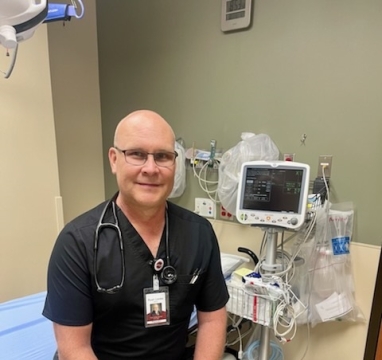The holiday season is a time for celebration, family gatherings, and joyful memories. Unfortunately, it’s also a time when illnesses like the stomach flu, or viral gastroenteritis, tend to spread. With people coming together to share meals and moments, it’s easy for germs to spread—making it especially important to stay informed and vigilant about protecting your health.
“Currently, there is an outbreak of norovirus, which causes gastrointestinal symptoms,” says Ryan Lieske, PA-C, Phelps Memorial Health Center Emergency Services. “Common symptoms include fever, chills, body aches, nausea, vomiting, stomach pain, and diarrhea.”
How the Stomach Flu Spreads
The most common way to catch viral gastroenteritis is through contact with an infected person or by consuming contaminated food or water. Lieske said, “Holiday family gatherings during this time of year are great ways to spread viral gastroenteritis through close contact and eating or drinking with family and friends.”
Symptoms usually appear within 4 hours to 3 days after becoming infected and can range from mild to severe symptoms typically last 1 to 2 days but may occasionally last as long as 10 to 14 days.
Self-Care and Recovery Tips
Fortunately, most people recover from the stomach flu without any difficulties or problems. While symptoms like nausea and vomiting can make it hard to keep food or fluids down, staying hydrated is crucial. Lieske advises, “Fluids and water are usually lost through vomiting and diarrhea, so an attempt should be made to drink extra fluids to make up for this loss.”
Older children and adults can drink sports drinks such as Gatorade or Powerade but these should not be used in younger children they should be given electrolyte fluid replacement solutions such as Pedialyte. Fruit juices and sodas should be avoided as they can make diarrhea worse. When trying to replace fluids small amounts such as 2 to 4 ounces every 30 to 60 minutes should be consumed. In infants and small children, smaller amounts such as a teaspoon/5 mL via syringe should be given. Small amounts of food frequently may be tried such as cereals, bread plain yogurt, bananas, apples, and vegetables.
When to Seek Medical Attention
If symptoms worsen or dehydration becomes a concern it is time to seek medical attention. With children, there may be no tears when crying, decreased number of wet diapers, sunken appearance to the eyes, or sunken soft spot in the infant's head. And, with adults, if they have confusion, dizziness, faint feeling, and have no urine output for greater than 8 hours and a dark appearance to the urine seek medical attention. For most healthy people dehydration should not be a problem. If you notice blood in the diarrhea this may be a more severe infection and if this persists you should see your medical provider.
Prevention Is Key
To reduce your risk of catching or spreading the stomach flu, practice good hygiene and take precautions in shared spaces. Getting children vaccinated can help stop the spread of some viruses and provide an added layer of protection.
Lieske said, “Careful preparation of food and cleaning of surfaces where food is prepared is essential.” He added, “Regularly disinfect high-touch surfaces like doorknobs, faucets, and countertops, especially if someone in your home is ill. Avoid sharing utensils or drinks, and encourage frequent handwashing.”
Teaching children proper hygiene practices, such as washing hands after using the restroom and before meals, is another important step in prevention.
“Avoid travel and exposure to others when you are not feeling well,” said Lieske.
Stay Healthy This Season
The stomach flu may be common, but with the right precautions, you can significantly lower your risk of illness. Prevention is the best way to avoid spreading or catching the virus.
Lieske said, “If you do become severely ill treatment is typically with IV fluids, but unfortunately at this time IV fluids are at a critical shortage level and are only being utilized in life-threatening situations.” He added, “There is no other specific medical treatment for viral gastroenteritis, antibiotics are not effective against viruses. Treatment first involves self-care measures such as staying hydrated.”
By staying informed and taking proactive steps, you can protect yourself and your loved ones.



